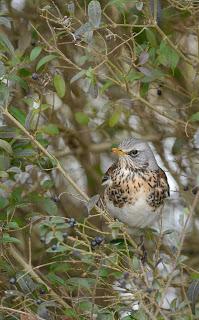
© Ben Andrew
· Freezing conditions force hungry winter visiting birds, fieldfares and redwings, into gardens· These thrushes will have spent the last few months in the countryside but now food is in short supply· The RSPB is receiving large numbers of calls from people reporting sightings of them in their gardens· The charity is asking people to help these birds get through the winter by providing broken up apples, pears, mealworms, cheese and suet.The harsh effects of “The Beast from the East” and “Storm Emma” are driving desperate wild birds into gardens in search of food. Across the country large numbers of winter thrushes, fieldfares and redwings are turning up on lawns as the temperature plummets.Redwings are small thrushes with brown backs, streaked breasts and patches of red under their wings. Their larger cousins, fieldfares, have blue gray hoods, gray brown backs, streaked breasts and a white rump. These birds usually spend the winter roaming the British countryside in search of berries and other fruit.
At this point in winter much of this natural food supply will have been used up. So with the weather now turning dramatically for much of the UK, these hungry birds have moved into gardens for food, water and shelter.
The RSPB’s Jamie Wyver says “We are getting a lot of phone calls and social media messages from people reporting these birds in their gardens. It’s quite unusual to see this and it shows the harsh weather conditions are really affecting them. You can help these beautiful visitors get through this cold snap by putting out fruit like apples and pears, crumbled cheese or suet, and mealworms. Remember they’ll need water too, so keep your bird bath topped up and ice free.”
Redwings and fieldfares will remain in the UK until around the end of March when they return to Iceland and Scandinavia to nest.
For more tips and activities on how to help birds and wildlife in your garden all year round, visit www.rspb.org.uk/homes

